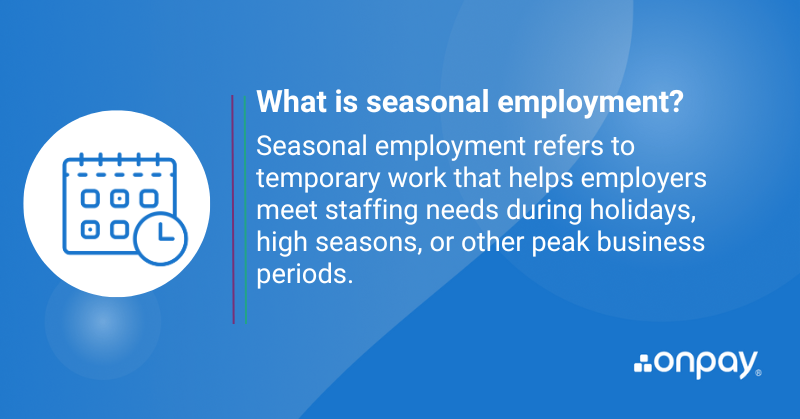Updated: November 9, 2024
Seasonal employment definition and meaning
Seasonal employment refers to temporary work that helps employers meet staffing needs during holidays, high seasons, or other peak business periods.
More about seasonal employment
Simply put, seasonal employment can make a lot of sense for businesses that are only open for part of the year or may require extra hands at different times of the year. Individuals who fill these roles are typically temporary workers who are only occasionally on the payroll, rather than traditional, full-time employees, who employers expect to be available year-round.
For example, a retailer may bring on a sizable number of seasonal employees in December, when consumer demand might be at its peak because of the holidays. Some of the most common examples of seasonal positions, aside from the retail scenario we just highlighted, include delivery drivers, tour guides, tax professionals, event staff, hospitality workers, servers and bartenders, and even customer service representatives.

Industries where seasonal employment is common
Seasonal employees are widely used (and generally realize the work is going to be temporary) in a number of industries, including:
- Retail: Due to the increased demand for shopping, the retail industry tends to hire seasonal employees in the fall and winter seasons. These employees may work as cashiers, gift wrappers, or shelf-stockers.
- Construction: A lot of builders depend on seasonal employees to support them in the spring and fall, especially if they’re in areas with very hot or wet summers.
- Agriculture: Farms are usually busiest in the fall and often hire farmers, landscape laborers, or other seasonal workers during their peak months of September and October.
- Tourism: Some vacation destinations are popular in the summer or winter and depend on seasonal employees to meet their guests’ needs during those times.
What does the IRS consider to be seasonal employment?
According to the IRS, a seasonal employee is someone who performs labor or services for a duration of 12 months or less. For example, if you hire a worker in December to help you with the holiday rush, but they end up staying for the next 12 months, they’re no longer considered a seasonal employee.
Regardless of whether your employees are seasonal or full-time, they must complete a W-4 tax form so you can report their income to Uncle Sam. This form will also help you to know how money you should withhold from their paychecks to cover federal and state taxes.
Potential pros of seasonal employment for employers
The most noteworthy benefits of seasonal employment include:
- Lower payroll costs: By hiring as-needed seasonal employees, you can reduce payroll expenses. You’ll only have to pay your workers when they actually do their jobs.
- Chance to “try out” an employee: If your business is open year-round, you can “test out” seasonal employees. You may always bring them on full-time if you like their work. On the flip side, if they don’t meet your expectations you may let them go after a few months.
- Faster hiring process: Compared to full-time employees, seasonal employees are usually faster to hire. You may have a less rigorous vetting process for them, as well as shorter contracts.
Potential drawbacks of seasonal employment for employers
Before you move forward with seasonal employees, consider these disadvantages:
- Less motivated workers: If employees know they’ll only be around for a short period of time, they may not take their positions as seriously as full-time employees. To prevent this, state your expectations upfront and foster a positive culture as well as an enjoyable work environment.
- Minimal training: Oftentimes, seasonal employees receive reduced job training compared to full-time employees (hours or days compared to weeks or months). This can cause workers to become stressed or unprepared for their workload. Be sure to implement a thorough training program for seasonal employees so that they feel confident about their performance.
- Loyalty may lack: It’s not uncommon for seasonal employees to suddenly switch jobs or provide little notice because they found a position with higher pay or more flexibility. To reduce the risk of seasonal employees leaving before you’d like them to, pay them fairly and make sure they know that they’re valued.
- Can be difficult to find: Depending on your industry and the types of seasonal employees you need, it may be a challenge to find these workers. Some people may prefer more stable, full-time employment.
Using seasonal employment in a sentence
“It was exciting to see how our holiday promotion paid off again this year. Now that it seems to be part of a larger trend for our shop, next time around I’ll be on the lookout for those interested in seasonal employment earlier in the year.”
Terms related to: Seasonal employment
Articles and resources related to: Seasonal employment

